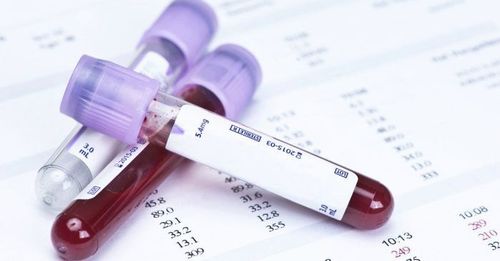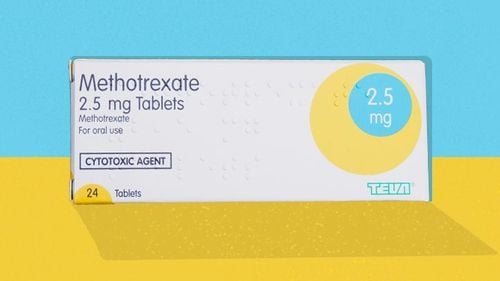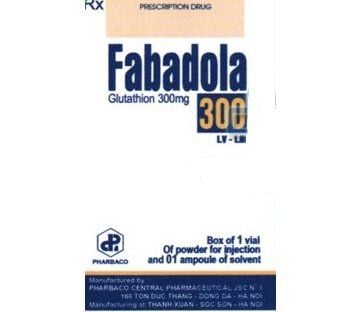This is an automatically translated article.
The article is professionally consulted by Master, Doctor Nguyen Minh Tuan - Pediatrician - Department of Pediatrics - Neonatology - Vinmec Danang International General Hospital.Children with congenital immunodeficiency often have reduced resistance to infectious agents, so they are very susceptible to infections. Infections are often severe and prolonged, difficult to treat, increasing the risk of death very high. Therefore, early detection and timely treatment will minimize the danger and protect the child's resistance.
1. What is congenital immunodeficiency in children?
Congenital immunodeficiency or primary immunodeficiency in children is an inherited disorder of the body's immune system caused by genetic mutations. The child's body does not produce enough immune cells or antibodies to fight off pathogens. Accordingly, children with congenital immunodeficiency will have reduced resistance, putting them at high risk of severe or prolonged infections compared to normal children. If not detected and treated promptly, it can leave serious complications, even life-threatening. However, if detected early, children can be treated stably with supportive methods.Although this is a chronic genetic disease, if the child is detected before 3-6 months of age and treated promptly, the chance of recovery can reach 80-90%. Children with IgG deficiency disease, if they receive a regular monthly infusion of immune replacement products, they can still study, play and have a normal life like you. For severe combined both cell and humoral immunodeficiency, stem cell transplantation opens up the future in treatment.

2. Signs of congenital immunodeficiency in children
Congenital immunodeficiency in children is characterized by the child's susceptibility to infectious agents, especially opportunistic infections, which may not occur in children with normal immune systems. . The following are some signs that suggest the child has congenital immunodeficiency:The child has severe and prolonged infections, such as bronchitis, pneumonia, sinusitis, ear infections ... .or infections recurrent (pneumonia more than 2 times/year, ear infections more than 8 times/year, sinusitis more than 2 times/year) Long-term antibiotic treatment (more than 2 months) but little effect. Children with growth retardation, weight loss, growth retardation For infants, often delayed umbilical cord shedding, which can last more than 30 days Children with persistent tinea versicolor or oral thrush Family history of congenital immunodeficiency Childbirth Children present on 2 foci of deep infection Inflammation and infection of internal organs occur, and inflammation of many organs can occur at the same time. Children often have poor appetite, prolonged diarrhea To treat infections, antibiotics are needed. Some children with congenital immunodeficiency may have systemic reactions when vaccinated with live attenuated vaccines, such as chickenpox vaccine, BCG vaccine against tuberculosis.... White blood cell count Peripheral lymphocyte counts fall below 2500/ml. Infectious diseases are often repeated many times in children with congenital immunodeficiency. These children are often treated with high-dose antibiotics, but the effect is not much.
3. Diagnosis of congenital immunodeficiency in children
To diagnose congenital immunodeficiency in children, the doctor will order a blood test. In addition, taking personal and family medical history as well as information about the child's development will help the doctor make a more accurate diagnosis of the child's pathology. If detected early and treated promptly, children will be able to have a better quality of life, be able to develop normally.
4. Treatment of congenital immunodeficiency in children
When a child has any of the above abnormal signs related to congenital immunodeficiency, it is necessary to take the child immediately to a specialized medical facility for timely examination, diagnosis and treatment, to avoid complications. serious complications. Some methods of treating congenital immunodeficiency in children such as:Treatment with antibiotics to fight infections, sometimes for a long time. Use intravenous immunoglobulin (IVIG) therapy. Use growth factors. In some cases, children with severe immunodeficiency may need a bone marrow transplant. In addition, in order for the treatment to be most effective, it is necessary to create a healthy lifestyle in children, specifically as follows:
Children need regular body hygiene, washing hands with soap after going to the toilet and before eating. Brush teeth after eating, take care of children's teeth. Regularly practice sports. Building a reasonable diet, ensuring hygiene helps strengthen resistance, prevent infection. Do not put pressure on the child, create a comfortable psychology for the child, avoid stress and hinder the immune system from working. During pregnancy, it is necessary to monitor and examine regularly, follow the instructions of the doctor. It is necessary to avoid bringing children to crowded places or places where dangerous epidemics are occurring, to protect children from diseases such as influenza, smallpox, meningitis, hepatitis, measles... considered a dangerous disease, especially the risk of infection can lead to death of young children. Therefore, when seeing any of the above abnormal signs, it is necessary to immediately take the child to a specialized medical facility for timely diagnosis and treatment.
Currently, Vinmec International General Hospital has a package of general health check-ups for children. When using the Examination Package, children receive a comprehensive examination, from eyes, teeth, blood pressure, weight to necessary tests, combined with diagnostic imaging. The examination package helps you check your baby's overall health, screen for symptoms for early detection and treatment if needed.
Master. Doctor. Nguyen Minh Tuan has over 27 years of experience in the field of Pediatrics. Doctor was former Deputy Department of Pediatrics - Da Nang Obstetrics and Gynecology Hospital before working as a Pediatrician at the Department of Pediatrics - Neonatology - Vinmec Danang International General Hospital as it is today.
MORE:
Common Immune Deficiency Diseases What is congenital immunodeficiency? Causes and signs of immunodeficiency
Please dial HOTLINE for more information or register for an appointment HERE. Download MyVinmec app to make appointments faster and to manage your bookings easily.














